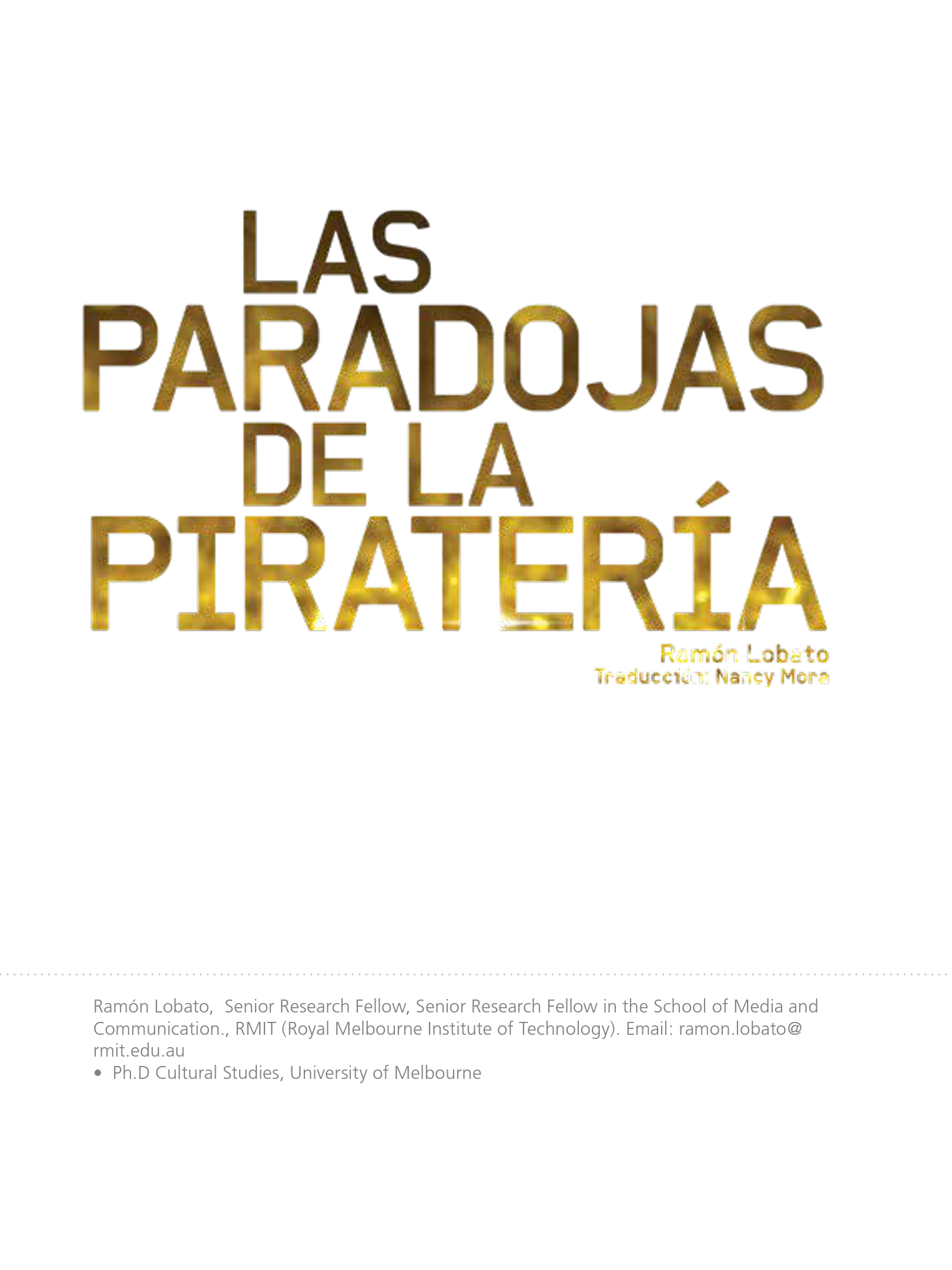
Published 2018-12-21
Keywords
- Piracy,
- copyright critique,
- intellectual property,
- informality,
- global media
How to Cite
Copyright (c) 2018 Ramón Lobato

This work is licensed under a Creative Commons Attribution-NonCommercial 4.0 International License.
Abstract
Speaking about piracy as a thing, as a coherent practice, makes sense in certain situations. Yet it can also erase the difference between cultural and media practices that would be better considered on their own terms. Hence piracy often becomes a stand-in for incommensurable activities. This paper offers a critical review of the ongoing "¹piracy debate"º by focusing on a particular problem that runs through the current conversation "”a problem of naming. Specifically, I want to consider what is at stake in the term "˜piracy"™ itself. The aim here is not only to make the usual point about the "˜pirate"™ label "”that it criminalises everyday activities"” but rather to explore a more subtle tension within the critical counter-discourse on intellectual property, about whether a language of "˜piracy"™ should be embraced, rejected, recuperated or rearticulated.
Downloads
References
- Alarcón, D. (2009). Life Among the Pirates. Granta 109. Web.
- BBC (2013). Antigua Applies for Permission to Run "Pirate" Website. BBC News, 25 de enero. Web.
- Dawdy, S. L. y Bonni, J. (2012). Towards a General Theory of Piracy. Anthropological Quarterly 83 (3): 673-700.
- Floyd, S. (2008). The Pirate Media Economy and the Emergence of Quichua Language Media Spaces in Ecuador. Anthropology of Work Review 29 (2): 34-41.
- *Fredriksson, M. (2012). Piracy, Globalisation and the Colonisation of the Commons. Global Media Journal - Edición Australiana 6 (1): 1-10.
- Haven, P. (2011). Cuba Tries to Drag Shadow Economy into the Light. Forbes.com, 5 de julio. Web.
- Hemmungs Wirtén, E. (2006). Out of Sight and Out of Mind: On the Cultural Hegemony of Intellectual Property (Critique). Cultural Studies 20 (2-3): 282-91.
- Johns, A. (2010). Piracy: The Intellectual Property Wars from Gutenberg to Gates. Chicago, IL: University of Chicago Press.
- Karaganis, J. (ed.) (2011). Media Piracy in Emerging Economies. Nueva York: Social Science Research Council.
- Kennedy, J. (2013). Rhetorics of Sharing: Data, Imagination, and Desire. En G. Lovink y M. Rasch (eds.). Unlike Us Reader: Social Media Monopolies and Their Alternatives, 127-36. Amsterdam: Institute of Network Cultures.
- Larkin, B. (2004). Degraded Images, Distorted Sounds: Nigerian Video and the Infrastructure of Piracy. Public
- Culture 16 (2): 289-314. (2008). Signal and Noise: Media, Infrastructure, and Urban Culture in Nigeria. Durham, NC: Duke University Press.
- Liang, L. (2009). Piracy, Creativity and Infrastructure: Rethinking Access to Culture. Social Science Research Network. Web.
- Lobato, R. (2008). The Six Faces of Piracy: Global Media Distribution from Below. En R. Sickels (ed.). The Business of Entertainment, vol. 1: The Movies, 15-36. Westport: Praeger.
- "”. (2012). Shadow Economies of Cinema: Mapping Informal Film Distribution. Londres: British Film Institute.
- Pang, L. (2006). Cultural Control and Globalization in Asia: Copyright, Piracy, and Cinema. Londres: Routledge.
- Pertierra, A. (2012). If They Show "Prison Break" in the United States on a Wednesday, by Thursday It Is Here: Mobile Media Networks in Twenty- First- Century Cuba. Television & New Media 13 (5): 399-414.
- Philip, K. (2005). What is a Technological Author? The Pirate Function and Intellectual Property. Postcolonial Studies 8 (2): 199-218.
- Rone, J. (2013). Bulgarian Pirates: At the World"™s End. Cultural Trends 22 (1): 1-12.
- Sezneva, O. (2012). The Pirates of Nevskii Prospekt: Intellectual Property, Piracy and Institutional Diffusion in Russia. Poetics 40 (2): 150-66.
- Sundaram, R. (2009). Pirate Modernity: Delhi"™s Media Urbanism. Londres: Routledge.
- Wang, S. (2003). Framing Piracy: Globalization and Film Distribution in Greater China. Lanham, MD: Rowman & Littlefield.
- Wark, M. (2004). A Hacker Manifesto. Cambridge, MA: Harvard University Press.
